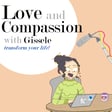
Ep.67- Building a Compassionate Child Welfare System with Peter Mutabazi
Transcript
Gissele: Martin Luther King write, does love have the power to turn an enemy into a friend? Does it have the power to heal? This year, we are creating an inspiring documentary, courage to Love the Power of Compassion, which explores the extraordinary stories of those who have chosen to do the unthinkable love and forgive those who are most hurtful Through their journeys, we will uncover the profound impact of forgiveness love, not only on those offering it, but also those receiving it.
In addition, we’ll hear from experts who will explore whether love and compassion are part of our human nature, and how we can bridge divides with those we disagree with. If you’d like to support our film, please donate at [00:01:00] http://www.maitricentre.com/documentary
. Hello and welcome to The Love and Compassion Podcast with Gissele
We believe that love and compassion have the power to heal our lives and our world. Don’t forget to like and subscribe for more amazing content. Today we’re gonna be talking about compassion and love in the foster care system. Our guest today is Peter Mutabazi entrepreneur international advocate for children and founder of Now I am known a corporation that supplies resources to encourage and affirm children.
Peter is a single dad, foster parent, who was a former street kid in Uganda. He has worked for Compassion International and the Red Cross. He has appeared on BBC in the Today Show and is author of the book now I am known. Please join me in welcoming Peter. Hi Peter.
Peter: Hey, how are you?
Gissele: I’m good. [00:02:00] How are you?
Peter: I’m good. What a joy to be with you today.
Gissele: Yes. I’ve been, I’ve been following your story for such a long time. I’m such a huge admirer of the work that you do. I followed your story with Anthony and also I used to work in the child protection system and so lots of issues with children that didn’t feel loved and accepted and with sometimes struggling with foster parents who didn’t understand the behavior problems.
And so that’s why your journey is such powerful, powerful reminder of how important it’s to have presence, to have compassion, including for yourself. So I’d like to begin by asking you how you got to this place. Like what was your journey like in terms of going from the streets of Uganda to now having this incredible social media presence and really kind of carving a new way for foster care?
Peter: Well, you know, I was, you know, I was born in Uganda among the poor of the poorest you could imagine. You know I [00:03:00] never had one meal a day. I had one meal every other day. We could not afford beans and potatoes, you know, grew up in a place where I had to go fetch water three to four miles away one way twice a day, like there was no time to be a child.
And two, you know, at age of four, I began to realize that not only are we poor, but my dad was abusive as well. So grew up in a place where, you know, the only words I heard for my dad was, you’ll never amount to anything. You’re nobody. I wish you never born. So I did not have to feed you. And those are the things I heard for my dad.
So for me, internally, life was miserable outside. It was miserable. at the age of, you know, 10, I, I, I knew my father would kill me, so I thought, wait a minute, you know, I would rather die in the hands of a stranger.
So I ran away, and that’s how I became a street kid. And from the age 10 to almost 16. As street kids, we are treated more like stray animals. Like really, people viewed us as we are, we are nobody. We are scum of the earth in some way. Mm-hmm. And somehow we believed it because that’s what we looked like. I mean, I lived in a
